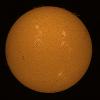Astronomy
How the Apollo Missions Unlocked the Origins of the Moon
You know, if you think about it, and trust me we’re about to, the Moon is kind of weird.
Advancing Lunar Habitats with Thermoelectric Power Generation
How can thermoelectric generators (TEGs) help advance future lunar surface habitats? This is what a recent study published in Acta Astronautica hopes to address as a team of researchers from the Republic of Korea investigated a novel technique for improving power efficiency and reliability under the Moon’s harsh conditions. This study has the potential to help mission planners, engineers, and future astronauts develop technologies necessary for deep space human exploration to the Moon and beyond.
New Study Suggests We Should Search for "Spillover" from Extraterrestrial Radio Communications
New analysis of human deep space communications suggests the most likely places to detect signals from an extraterrestrial intelligence.
The Moon’s Dirty Past
How do you tell how old an astronomical object is? I mean, the next time the Moon is in the sky, take a look at it. How would you even begin to answer that question?
A Bone Loss Experiment is Headed For the ISS
The 33rd SpaceX commercial resupply services mission for NASA, scheduled to lift off from the agency's Kennedy Space Center in Florida in late August, is heading to the International Space Station with an important investigation for the future of bone health.
Stem Cells Preserved in Space Have Produced Healthy "Space Mice"
Using stem cells from mice, researchers from Kyoto University tested the potential damage spaceflight can have on spermatazoa stem cells and the resulting offspring. After six months aboard the ISS, the stem cells were used to successfully produce healthy offspring.
What is the Moon Made Of? (Hint: It’s Not Cheese)
A set of instruments shut off almost 50 years ago are still producing useful results. It’s the seismometers left by the Apollo missions to monitor moonquakes, which as the name suggests are earthquakes but on the Moon.
Halley-Like Comets Could Have Seeded Earth With Water
Comets are like the archeological sites of the solar system. They formed early on, and their composition helps us understand what the area around the early Sun was like, potentially even before any planets were formed. A new paper from researchers at a variety of US and European institutions used the Atacama Large Millimeter Array (ALMA) to capture detailed spatial spectral images of comet 12P/Pons-Brooks, which is very similar to the famous Halley’s comet, and might hold clues to where the water on the Earth came from.
Another Earth-like Exoplanet Crossed Off The List: The JWST Shows That GJ 3929b Has No Atmosphere
In 2022, astronomers announced the discovery of GJ 3929b. It's a rocky planet, similar to Earth in both mass and size. Astronomers have examined the planet with the JWST and concluded that it's a barren world with no atmosphere.
'Futurama' is back on Hulu, and Season 13 looks bigger and better than ever (video)
Scientists discover minerals in asteroid Ryugu that are older than Earth itself
Mars quiz: How well do you know the Red Planet?
Don't miss the crescent moon meet up with blue star Spica tonight
Repeated Heat Waves Can Age You as Much as Smoking or Drinking
A new long-term study suggests that the more heat waves people are exposed to, the more their body’s aging process accelerates
Exoplanets engulfed in steam are taking center stage in the search for life in our galaxy
Inside the revolutionary idea that we can negotiate with cancer
Inside the revolutionary idea that we can negotiate with cancer
Relive SpaceX's nighttime launch of the X-37B space plane with these dazzling photos
Weird X-ray Flashes Lose Some of Their Mystery
Some fast X-ray transients — quick flashes of energetic radiation — may come from massive stars collapsing and exploding at the same time.
The post Weird X-ray Flashes Lose Some of Their Mystery appeared first on Sky & Telescope.


